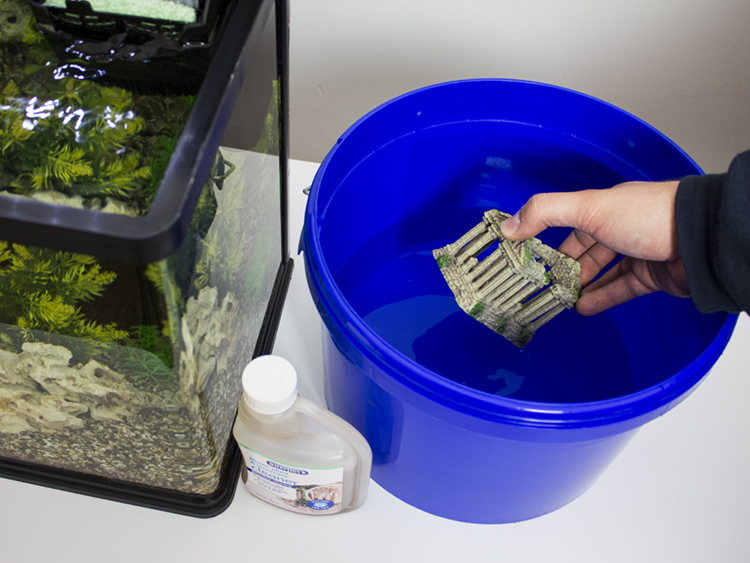As an aquarium enthusiast, you know that maintaining the beauty of your underwater world involves more than just monitoring water quality and feeding your fish. One crucial aspect often overlooked is the cleaning of fish tank decorations. In this guide, I’ll share my personal experiences and detailed insights on how to keep your aquarium ornaments sparkling clean, ensuring your fish thrive in a healthy environment.
Why Cleaning Fish Tank Decorations Is Important
Keeping fish tank decorations clean is vital for several reasons:
- Aesthetic Appeal: Clean decorations enhance the beauty of your aquarium, making it more visually appealing.
- Preventing Algae Growth: Regular cleaning helps prevent algae buildup, which can harm fish and ruin the aesthetic of your tank.
- Health of Aquatic Life: Dirty decorations can harbor harmful bacteria and parasites that may affect the health of your fish.
- Water Quality: Dirt and detritus from decorations can affect water quality, leading to elevated ammonia or nitrate levels.
Common Types of Fish Tank Decorations
Before diving into the cleaning process, let’s explore the various types of fish tank decorations and their cleaning requirements:
- Natural Decor: Rocks, driftwood, and plants.
- Synthetic Decor: Plastic plants, resin ornaments, and ceramic decorations.
- Live Plants: While they require different care, they still can be a part of your cleaning regimen.
How Often Should You Clean Fish Tank Decorations?
Cleaning your fish tank decorations should be a part of your regular maintenance routine. Here’s a breakdown:
| Decor Type | Cleaning Frequency | Cleaning Method |
|---|---|---|
| Natural Decor | Every 4-6 weeks | Boil or soak in water |
| Synthetic Decor | Every 2-4 weeks | Scrub with a soft brush |
| Live Plants | Weekly pruning | Leave in tank, remove dead leaves |
Cleaning Methods for Different Decor Types
1. Natural Decor
Natural decorations such as rocks and driftwood can accumulate organic waste and algae over time. Here’s how to clean them:
- Boiling Method: Boil the decor in water for 10-15 minutes to kill algae, bacteria, and parasites.
- Soaking Method: Soak in a solution of water and aquarium-safe bleach for a few hours, followed by thorough rinsing.
- Scrubbing: Use a soft brush to scrub off any remaining residue.

2. Synthetic Decor
Synthetic decorations are easier to clean, but they can still harbor algae and debris. Here’s how to keep them clean:
- Rinse: Remove the decorations and rinse them under warm water.
- Brush: Use a soft-bristled brush to scrub off algae and grime.
- Disinfect (Optional): If heavily soiled, soak in a diluted bleach solution, then rinse thoroughly.
3. Live Plants
For live plants, cleaning is a bit different:
- Prune Regularly: Trim dead or decaying leaves to promote healthy growth.
- Remove Debris: Use a siphon to remove detritus that may settle around the plants.

Tools and Supplies for Cleaning Fish Tank Decorations
Here’s a list of essential tools and supplies you’ll need:
- Soft-bristle Brush: Ideal for scrubbing decorations without scratching.
- Bucket: For soaking and rinsing decorations.
- Aquarium-safe Bleach: A diluted solution for disinfecting when necessary.
- Siphon/Vacuum: For cleaning the substrate and removing debris.
- Gloves: Protect hands if using any chemicals.
Personal Experience: My Cleaning Routine
As an avid aquarium keeper, I’ve developed a routine that works for me. Every month, I set aside time to clean my decorations thoroughly:
- First, I remove all synthetic decorations and give them a good scrub.
- Next, I tackle my natural rocks and driftwood with the boiling method, ensuring they are clean and free of parasites.
- Lastly, I spend time checking my live plants, pruning away any dead foliage to keep the tank healthy.

Pros and Cons of Various Cleaning Methods
Natural Decor
Here’s a quick overview of the pros and cons of cleaning natural decor:
| Pros | Cons |
|---|---|
| Eco-friendly cleaning options. | Can leach tannins if not properly cleaned. |
| Unique look enhances aesthetics. | More susceptible to algae growth. |
Synthetic Decor
Pros and cons of cleaning synthetic decorations:
| Pros | Cons |
|---|---|
| Easier to clean and maintain. | Can fade over time with exposure to light. |
| Durable and long-lasting. | May not provide as natural a look. |

Live Plants
Cleaning live plants also has its pros and cons:
| Pros | Cons |
|---|---|
| Help maintain water quality and oxygen levels. | Require more labor-intensive maintenance. |
| Add a beautiful natural element. | Can be sensitive to water parameters. |
Common FAQs About Cleaning Fish Tank Decorations

1. Can I use regular household cleaners to clean my fish tank decorations?
No, regular household cleaners can leave harmful residues that may affect fish health. Always use aquarium-safe products.
2. How do I know if my decorations need cleaning?
If you notice visible algae growth, discoloration, or a strong odor, it’s a sign that your decorations need cleaning.

3. Is it safe to clean my aquarium decorations in the tank?
While some decorations can be cleaned in place, it’s often better to remove them to avoid disturbing fish and the aquarium ecosystem.
4. Will cleaning my decorations cause stress to my fish?
Some disturbance is unavoidable, but if you maintain a steady and calm approach, your fish should adapt quickly.
Conclusion
Cleaning your fish tank decorations is a crucial part of aquarium maintenance that contributes to the overall health and aesthetics of your underwater world. By understanding the various types of decorations, the appropriate cleaning methods, and the importance of regular upkeep, you can ensure a beautiful and thriving aquarium environment. Remember, your fish deserve to live in a clean and safe habitat!
Happy fish-keeping!